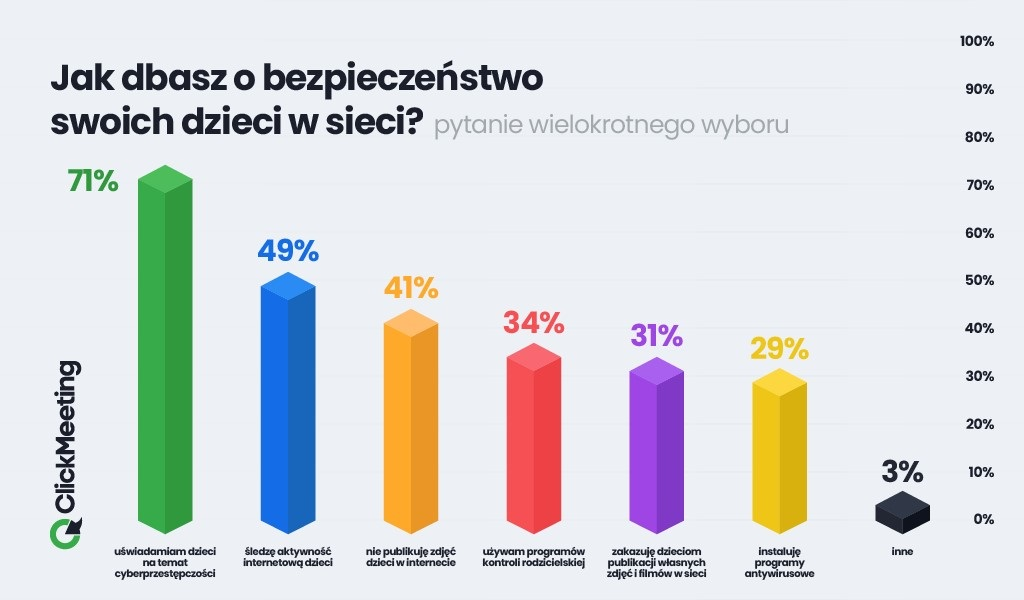 source: Clickmeeting Academy
source: Clickmeeting AcademyHow do parents protect their children’s online safety? Clickmeeting, a platform for webinars and online events, investigated this question. A survey conducted as part of the Clickmeeting Academy revealed the following:
- the most common approach (71%) is educating children about cybercrime,
- followed by monitoring the child’s internet activity (49%),
- not posting photos of children online (41%),
- using parental control software (34%),
- prohibiting children from posting their own photos and videos online (31%),
- and installing antivirus software (29%).
- For children, the virtual world is a natural part of their reality where they grow up. It’s the role of parents to show them how to use the internet wisely and keep them safe in the online world, comments Martyna Grzegorczyk from ClickMeeting in a statement summarizing the study results.
What about privacy?
It turns out that 43% of respondents say they protect their child’s privacy every time, and 48% not always, but they try. Only 7% admitted they don’t care about their children’s online privacy at all, because they don’t know how, and 1% of respondents even said they don’t care about children’s privacy online because it doesn’t matter to them.
At the same time, 54% of respondents believe their children are aware of online dangers, 36% do not, and 11% are unsure. According to 91% of respondents, it’s the parents’ responsibility to educate children about cybersecurity, and 74% believe the school should also be responsible. Meanwhile, 14% pointed to peers, and 1% marked the option: I don’t know. This was a multiple-choice question.
The survey participants are parents of children aged 7 to 18, living in towns with populations of up to 5,000 (21%), 5,000 to 20,000 (14%), 20,000 to 100,000 (27%), 100,000 to 500,000 (21%), and over 500,000 residents (17%). Respondents’ ages were 18-34 years (19%), 35-54 years (76%), and over 55 years (5%). Among all participants, 65% were women and 35% men.
Cyber threats to children
For many years, there has been talk and writing about the dangers children may encounter online without supervision. The situation and parents` awareness are slowly improving. According to the Safer Internet Foundation report:
- 43% of children aged 11-15 received unwanted sexual content online.
- 25% of children aged 11-15 experienced cyberbullying.
- 12% of children aged 11-15 encountered pornography online.
- 8% of children aged 11-15 were encouraged to meet a stranger in real life.
In Poland, more and more children are using the internet. According to research conducted by the Nobody’s Children Foundation, in 2020, 95% of children aged 10-17 used the internet, with 85% being online daily.
COMMERCIAL BREAK
New articles in section Law in media
Ai in disinformation. Operation Matryoshka and personalization of fakes
Anna Mikołajczyk-Kłębek
The increasing use of artificial intelligence to generate false content and profiled disinformation are trends that will shape the disinformation landscape in the coming years, according to Dr. Wojciech Kotowicz, an expert from the University of Warmia and Mazury (UWM) in Olsztyn, Poland.
Dietary supplement ads in Poland. Who keeps influencers in check?
Newseria, KFi
One in three Polish internet users considers influencer recommendations when deciding on medicines and dietary supplements. Although promotion of such products is regulated, there are still cases of advertising that skirt the law.
SEO Poisoning. Hackers Use Search Engines to Target Businesses
Piotr Rozmiarek
Search engines help us quickly find information, but they can also be used by cybercriminals. SEO poisoning is a tactic where attackers manipulate search engine rankings to place harmful websites at the top of search results.
See articles on a similar topic:
SLAPP Lawsuits in Europe. How Journalists and Activists Are Silenced
Krzysztof Fiedorek
The number of strategic lawsuits aimed at intimidating journalists, activists, and civil society organizations is increasing in Europe. According to the CASE SLAPPs Report 2024, as many as 1,049 such cases were identified between 2010 and 2023.
Data for Benefits: What Encourages Sharing Personal Information Online
Krzysztof Fiedorek
Most Poles are aware of the value of their personal data and do not share it without reason. However, one in five is willing to share data in exchange for benefits, and 16% of us do not remember if we have done so. These are the results of a study conducted by ChronPESEL.pl and the National Debt Register under the patronage of the UODO.
Illusory Security. Small and Medium Enterprises Easy Targets for Cybercrime
KF
35% of micro, small, and medium enterprises (SMEs) fear the theft of their employees' personal data. This comes from research conducted on behalf of ChronPESEL.pl and the National Debt Register of Poland.
Recognizing Fake News. Technologies for Creating False Information
BARD
Artificial intelligence is increasingly used to fake information. Software now allows manipulation of public appearances by politicians. Bots are also used more often in Poland, with hate speech and trolling among the internet’s biggest threats.





























